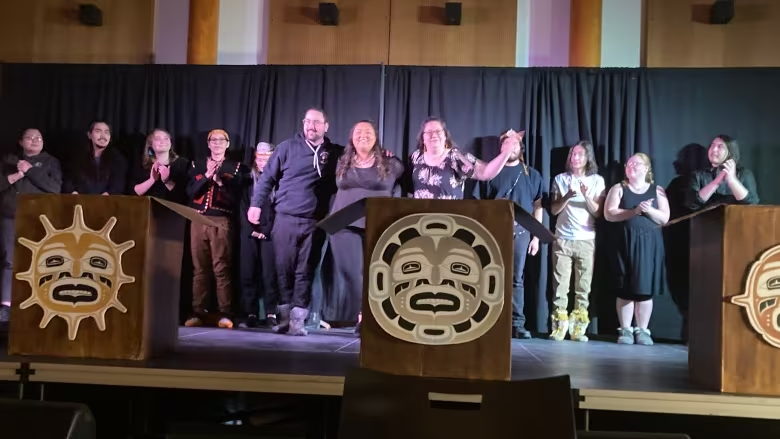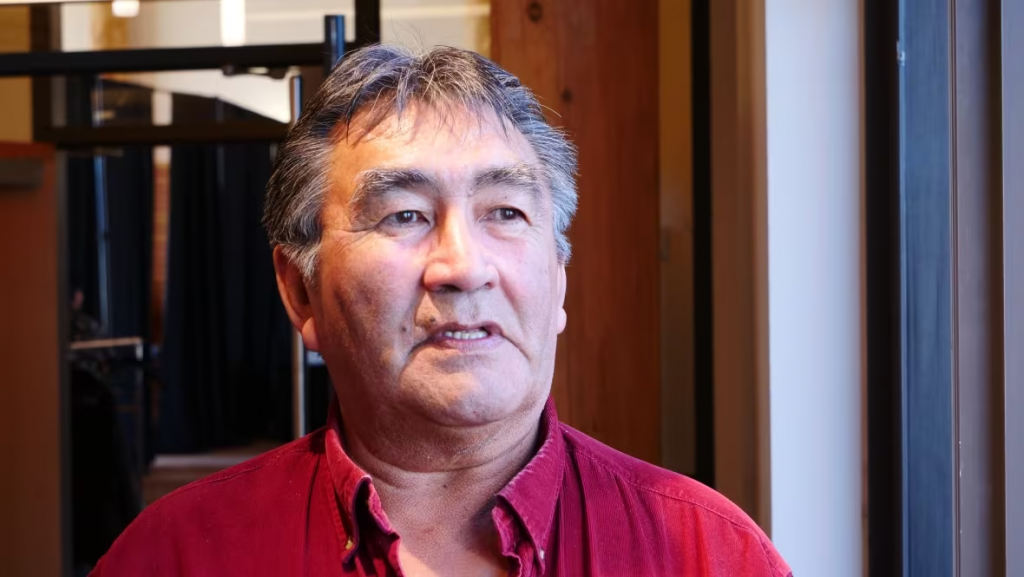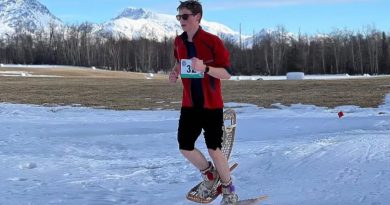Indigenous language program showcased at Yukon celebrations

· CBC News
Students from ‘Language Leaders Tomorrow’ program performed in Whitehorse on Thursday
Until a few years ago, Abigail Turner only knew a few words in her peoples’ language.
Gùnèłchīsh — thank you — was one of them. Now, she says, she can carry on a basic conversation in Tlingit, and she gets a sense of connection and pride when she speaks the language to an elder and she sees their eyes light up.
Turner is one of the youth participating in the Council of Yukon First Nations’ (CYFN) “Language Leaders Tomorrow” program. On Thursday, the group performed a multilingual version of How the Raven Stole the Sun at the Kwanlin Dün Cultural Centre in Whitehorse, as part of the 50th anniversary celebrations of Together Today for Our Children Tomorrow.
“Learning Tlingit, it’s like entering a completely different thought-world,” she said.
“Like the word Gùnèłchīsh, it actually translates more along the lines of, ‘I would not have been able to obtain this without you,’ which I think just carries a lot more depth and meaning.”
In an on-stage conversation with CYFN Grand Chief Peter Johnston at the event, James Allen emphasized the importance of thanking the people who help you to achieve your goals. Allen, chancellor of Yukon University, said he is thankful to his mother and to his sisters for his ability to speak Southern Tutchone.

During his term as chief of the Champagne and Aishihik First Nations, Allen and the council at that time passed a Language Act.
“We passed that hoping that the language would be embedded in our organizations and in our First Nations government,” he said.
“Steve Smith came in [as Champagne and Aishihik chief] after that, and he created a two-year language course for adults in the community. I’m glad that Steve took the next step after the Language Act was passed.”
‘Ripple effect throughout community’
The first cohort from that class has now graduated, and three of those students happen to work in the Shawkwunlee Daycare Centre in Haines Junction, Yukon.
“And so they’re able to share everything that they learned in the adult immersion program with our beautiful children, our dunènà,” said Erin Pauls, the education director for the Champagne and Aishihik First Nations.
“I think the whole community is really proud. We hear parents talking about how proud they are of their children speaking the language,” she said.
“And it compels them to start learning because they are speaking the language and they’ll come home and talk to their parents and their parents are like, ‘what are you saying?'”
Pauls — who also spoke on a panel in Whitehorse this week — says that the daycare teachers have created packages for the children to take home, so the learning can continue with their families.
“So it’s kind of seeped into the community and everything builds,” Pauls said. “We see a positive ripple effect throughout our whole community for all the language learning that’s happening.”
Related stories from around the North:
Canada: Mark Indigenous languages decade by making Inuktitut official in Canada: Inuit UN rep, The Canadian Press
Finland: Everyone encouraged to boost Sami language visibility in Finland, Norway and Sweden this week, Eye on the Arctic
Norway: Indigenous and minority language names for Norway now have official status, The Independent Barents Observer
Russia: German project to house everything published in Siberian and Arctic languages to seek new funding, Eye on the Arctic
Sweden: Can cross-border cooperation help decolonize Sami-language education, Eye on the Arctic
United States: Inuit leaders applaud UN move to designate International Decade of Indigenous Languages, Eye on the Arctic




And because they are speaking it, their parents are confused when they return home and ask, “What are you saying?” This prompts them to begin studying the language.